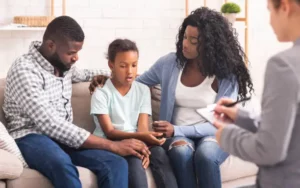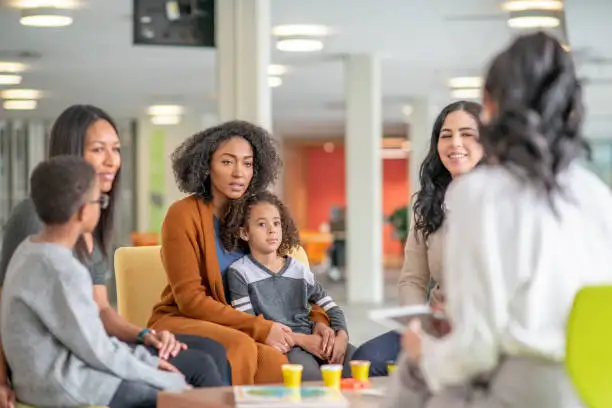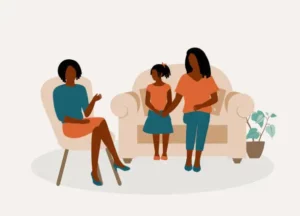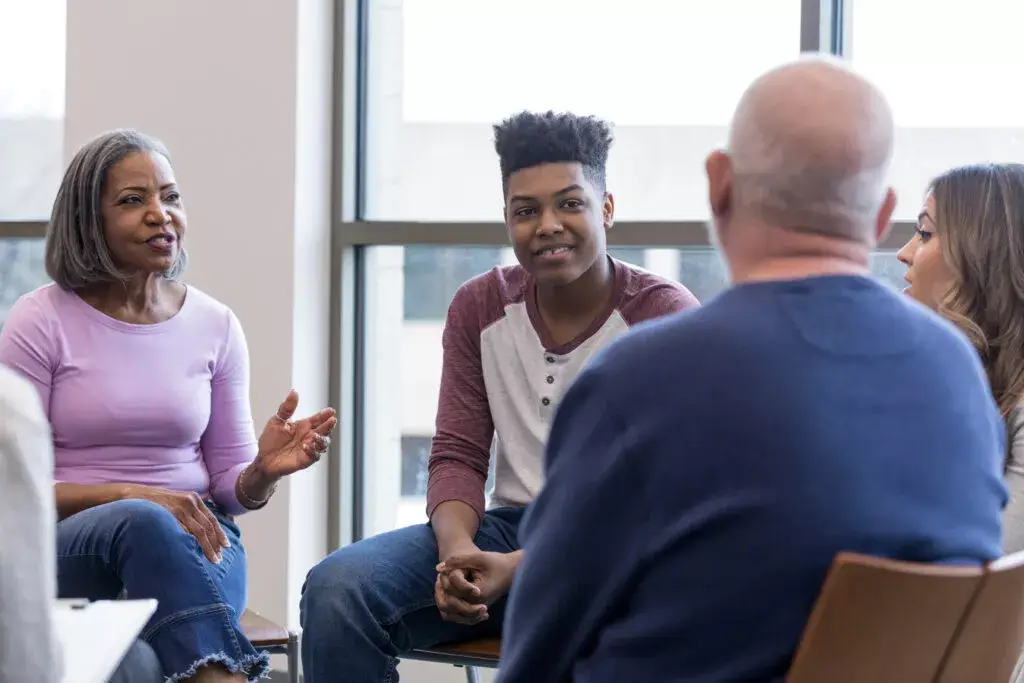In a world that often pulls us in various directions, maintaining strong and healthy family bonds can be challenging. Buckle up as we explore the challenges families face and discover how group therapy acts as a nurturing force that can help family members build stronger and healthier bonds.
Contents
Understanding Group Therapy For a Family
 Let’s step into the world of families and explore how group therapy becomes a lifeline in navigating the unique dynamics that unfold within our own homes.
Let’s step into the world of families and explore how group therapy becomes a lifeline in navigating the unique dynamics that unfold within our own homes.
Definition: Imagine a safe place where a family, guided by a skilled therapist, comes together to share their experiences, challenges, and triumphs. That’s the essence of family group therapy – a shared space where the family unit engages in therapeutic discussions under professional guidance.
Now, why might a family consider group therapy? Well, families, sometimes encounter challenges and issues that needs to be addressed for better and stronger bonds. It’s in these moments that group therapy steps in, offering a collective platform for healing. It’s not merely about individual struggles but addressing the shared challenges that affect the entire family.
Consider this scenario: a family facing communication breakdowns, conflicts, or even a sense of drifting apart. Group therapy becomes the compass, guiding them back to a space of understanding. It provides a unique opportunity for family members to see their challenges from different perspectives, fostering empathy and strengthening the familial bonds.
So, if you’ve ever wondered how families navigate the bumps in their journey together, group therapy might just be the answer.
What Issues Are Addressed in Family Therapy?
Navigating the complexities of family life can sometimes be difficult. Family therapy, particularly in a group setting, emerges as a powerful tool to address a wide range of challenges that families may encounter. Let’s explore the common issues that find resolution in the collective space of a family therapy session:
- Communication breakdowns
- Conflict resolution
- Parenting challenges
- Blended family issues
- Financial stress
- Grief and loss
- Substance abuse
- Mental health concerns
- Behavioral problems in children
- Infidelity
- Trust issues
- Cultural differences
- Life transitions (e.g., divorce, relocation)
- Sibling rivalry
- Role and boundary confusion
How Group Therapy Works for a Family?

In the realm of family therapy, the mechanics of group therapy unfold as a dynamic and transformative process. Let’s break down the stages and elements that make group therapy effective for families.
Introductions and Setting the Tone
At the beginning of a group therapy session, families are introduced, creating a comfortable atmosphere. The therapist sets the tone, emphasizing the collaborative nature of the session.
Sharing Experiences
Each family member has the opportunity to share their experiences, concerns, or successes. This open sharing fosters a sense of vulnerability and trust within the group.
Guided Discussions
The therapist facilitates structured discussions, addressing specific family issues. These conversations explore underlying dynamics, helping family members gain insights into each other’s perspectives.
Identifying Patterns and Dynamics
Through observation and discussion, the therapist helps the family identify recurring patterns and dynamics contributing to their challenges. Understanding these patterns is crucial for initiating positive change.
Building Communication Skills
Group therapy emphasizes improved communication within the family unit. Therapists introduce communication exercises and strategies to enhance how family members express themselves and listen to one another.
Conflict Resolution Strategies
Addressing conflicts is a key aspect. The therapist guides the family in developing practical conflict resolution strategies, promoting a healthier way to navigate disagreements.
Strengthening Empathy
Group therapy cultivates empathy within the family. As members share their experiences, others gain a deeper understanding, fostering a sense of connection and support.
Homework and Implementation
Therapists often assign homework or suggest practical exercises for the family to implement between sessions. This extends the therapeutic process into daily life.
Regular Check-Ins
As sessions progress, regular check-ins allow families to reflect on their progress and discuss any challenges. This iterative process ensures that the therapy remains tailored to the family’s evolving needs.
Gradual Closure
The therapy concludes gradually, allowing the family to reflect on their journey, celebrate achievements, and prepare for the continuation of their strengthened family dynamic.
Group therapy for families operates as a collaborative, evolving process, fostering positive change through shared experiences, communication enhancements, and a deeper understanding of family dynamics.
Techniques Used in Family Therapy
 Let’s shine a light on the techniques employed by therapists to navigate the intricate terrain of familial challenges. These techniques serve as the compass, guiding families towards understanding, growth, and resilience. Here’s a snapshot of the tools therapists use:
Let’s shine a light on the techniques employed by therapists to navigate the intricate terrain of familial challenges. These techniques serve as the compass, guiding families towards understanding, growth, and resilience. Here’s a snapshot of the tools therapists use:
- Structural Therapy: Examines and adjusts the family structure to promote healthier relationships.
- Strategic Therapy: Focuses on addressing specific issues through tailored interventions and strategic directives.
- Narrative Therapy: Explores and reshapes the family narrative, encouraging a more empowering and positive story.
- Systemic Therapy: Views the family as an interconnected system, identifying and addressing patterns of behavior.
- Behavioral Therapy: Targets specific behaviors within the family dynamic, promoting positive change through reinforcement.
- Communication-Focused Therapy: Enhances communication skills, fostering a more open and understanding dialogue among family members.
- Solution-Focused Brief Therapy: Concentrates on identifying and implementing solutions rather than dwelling on problems.
- Experiential Therapy: Utilizes activities and experiences to uncover and address underlying family dynamics.
- Cognitive-Behavioral Therapy (CBT): Examines and adjusts thought patterns and behaviors contributing to family challenges.
- Psychoeducation: Provides families with information and tools to better understand and manage their situation.
These techniques, in the hands of skilled therapists, create a customized roadmap for families, guiding them towards a more harmonious and resilient future.
Benefits of Group Therapy for Families
Embarking on a journey of family therapy isn’t just a step towards resolution; it’s a pathway to a host of transformative benefits. Here’s a glimpse of what families can expect to see as positive outcomes after engaging in group therapy:
- Improved communication skills
- Enhanced empathy among family members
- Strengthened family relationships
- Collective problem-solving
- Increased support network
- Development of conflict resolution skills
- Promotion of individual and collective growth
- Opportunities for shared learning
- Reduction in feelings of isolation
- Enhanced coping mechanisms
- Fostering a sense of belonging within the family unit
- Building mutual understanding and trust
- Improved emotional regulation
- Reinforcement of positive family dynamics
- Long-lasting positive impact on family well-being
Tips to Choose the Right Group Therapy for Your Family
 Embarking on the journey of group therapy for your family is a significant step towards positive change and strengthened bonds. To ensure you find the right fit, consider the following tips:
Embarking on the journey of group therapy for your family is a significant step towards positive change and strengthened bonds. To ensure you find the right fit, consider the following tips:
- Identify Specific Family Needs: Assess the unique challenges your family is facing, whether it’s communication issues, conflicts, or transitions. Look for a group therapy program that aligns with your family’s specific needs.
- Qualified Therapists: Ensure that the therapists leading the sessions are qualified and experienced in family therapy. Credentials and a proven track record contribute to a more effective therapeutic experience.
- Therapeutic Approach: Understand the therapeutic approach used in the group sessions. Different families may resonate with different methods, so choose one that aligns with your family’s values and preferences.
- Flexibility and Accessibility: Opt for a group therapy program that offers flexibility in terms of scheduling and accessibility. Online platforms, such as MantraCare and TherapyMantra, provide the convenience of virtual sessions that fit into your family’s busy lifestyle.
Searching for group therapy for your family? Explore the exceptional online services of MantraCare & TherapyMantra
- MantraCare: An online platform renowned for its comprehensive family therapy services. With a team of experienced therapists, MantraCare offers personalized sessions tailored to your family’s unique needs.
- TherapyMantra: A leading provider of online group therapy, TherapyMantra stands out for its innovative approach and commitment to fostering a supportive community. Their virtual sessions ensure that your family can access therapeutic support from the comfort of your home.
By incorporating these tips and considering reputable online platforms like MantraCare and TherapyMantra, you’re not just choosing group therapy; you’re investing in a transformative experience that caters to the specific needs of your family.
Conclusion
In conclusion, the journey of family growth through group therapy is a testament to the resilience and potential within each family unit. As we’ve explored the benefits, techniques, and tips to navigate this therapeutic path, it’s evident that group therapy is not just a remedy but a guiding light towards stronger and healthier family bonds.
If you’re ready to embark on this transformative journey, consider taking the first step with Online Family Issues Counseling at TherapyMantra. Book a trial online therapy session today and unlock the doors to a more connected, supportive, and harmonious family life. Your path to stronger bonds begins here.


